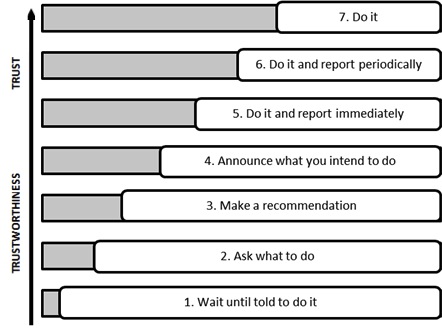
The first is that the change is initiated as a reaction. The economy has slowed down, or a particular initiative has not born the desired fruit, so a change is initiated – perhaps a change in direction or a change in focus. This, in itself, is not the problem. The problem is that these changes take place every few months and seem to be knee-jerk responses that come from fear, rather than being strategic responses to changing market conditions. When this happens several times in a year, or over several years it creates a sense amongst employees that you are lurching from one drama to the next – a bit like a rudderless ship in a storm. It is unsettling and creates uncertainty and insecurity for employees, customers, suppliers and other stakeholders. It does not inspire confidence.
On the other hand, if the business has made and communicated some very clear choices about where it’s going, where it plays (and doesn’t play), how it seeks to win (and which games it will not play) and what it is superbly better at than anyone else, any changes in direction that might be made can be communicated in the context of these choices. These changes will inspire confidence in a way that knee-jerk changes in direction will not – because they can be arrived at and explained with reference to the current, clear strategy. When the North Star is always in sight, changes will be seen in the light of their ability to keep the organisation flying right.
The second problem is that the people side of change is given short shrift – until serious resistance has become apparent – and then there is a whole “change management” intervention. This should have been an integral part of the change in the first place. In any change, people will focus on what they expec to lose. The change may result in a loss of status; it may mean that, whereas you used to be an expert, you are now a novice. It could mean that you lose a certain amount of comfort and predictability, or daily interaction with work buddies. Whatever it is, there will be loss. However, there will also be gain.
The best way to enable people to focus on what they will gain is to involve them in the change process before it even happens. Involve them in discussions in which it becomes clear that not to change is untenable. Let them feel the discomfort of staying the same so intensely that they cannot wait for the change to happen. This is called “constructive discontent” – when the discontent with what is is so intense that we cannot wait for what is to come. This can be done in focus groups and brainstorming sessions – and will pave the way for a far more positive response to the change when it eventually happens.
Read more about change by John Kotter, one of the best known change management experts: http://www.kotterinternational.com/the-8-step-process-for-leading-change/ .
Think about a change that you are going to have to roll out. Is its alignment with the company strategy clear? If not, how can you create clarity? Who can you talk to? Is it possible that you have knee-jerked out of fear and that you should actually go back to your strategy in order to more clearly think through how to respond to whatever gave rise to this change. How will you get people on board? How will you create constructive discontent so that your people cannot wait to make the change?
How has your leadership style and approach changed as a result of this series of articles? Please send me feedback and let me know what you would like more of. For previous articles in this series, follow this link.




 RSS Feed
RSS Feed


